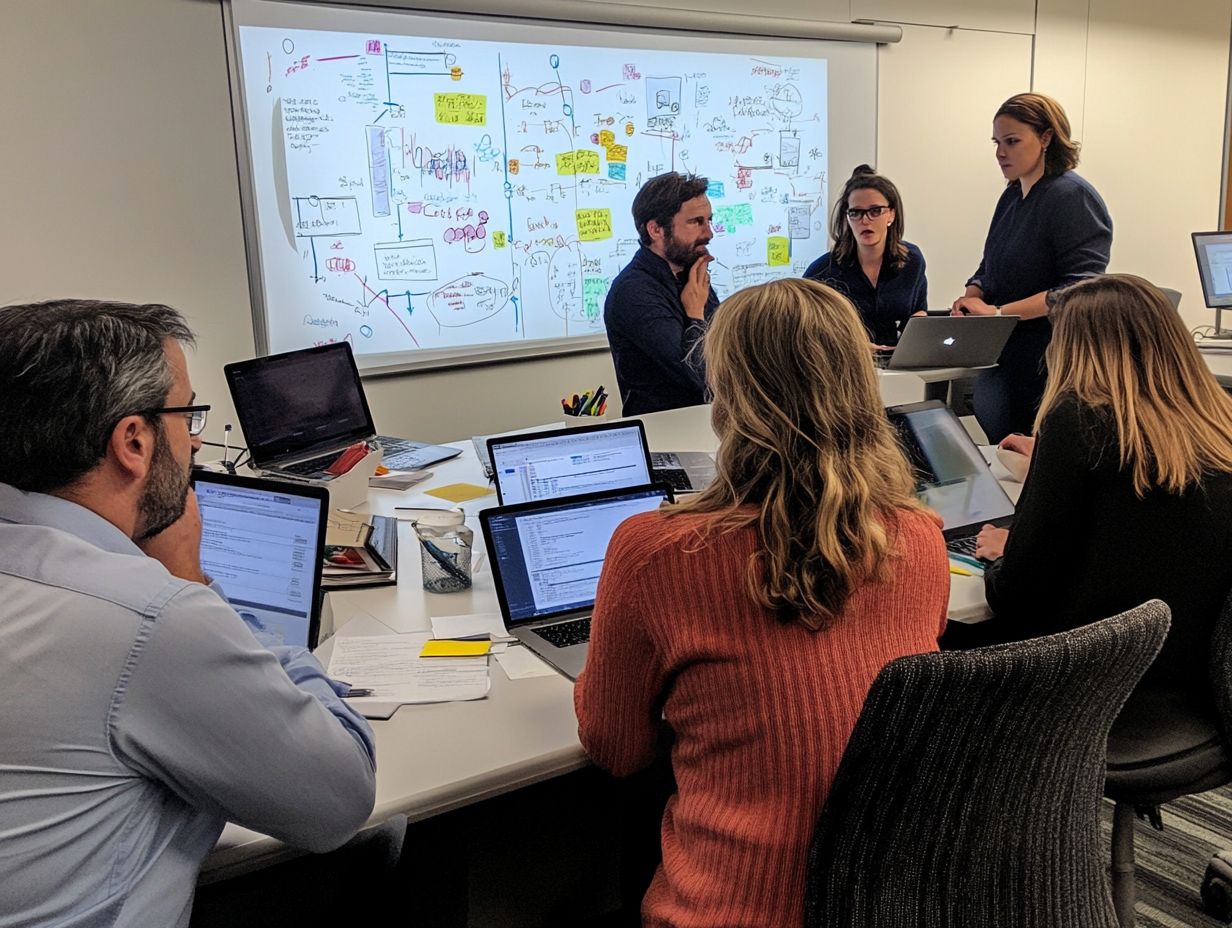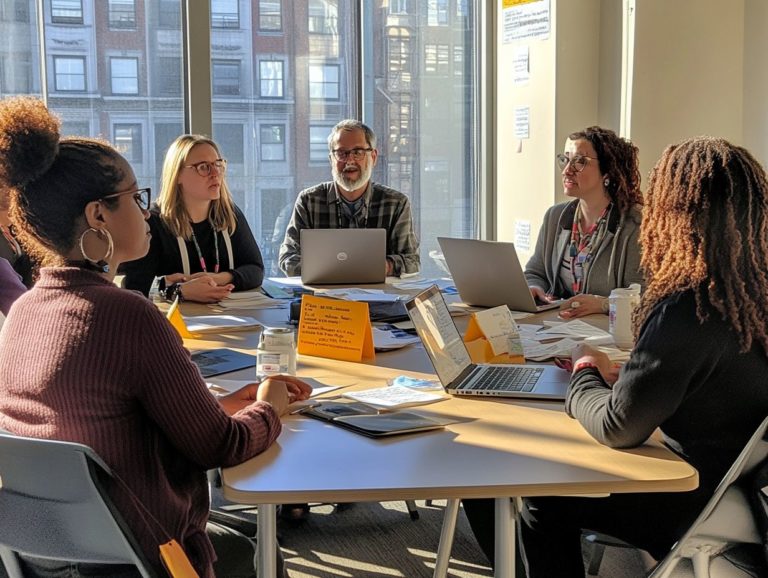Skill Enhancement as a Tool for Change Management
Change is an ever-present reality in today s dynamic business landscape. Effective change management is essential for your organization s success.
This article delves into how enhancing skills within your teams can facilitate successful change initiatives. It underscores the significance of communication, adaptability, and leadership development.
You ll discover strategies for implementing skill enhancement programs, measuring their impact, and tackling potential challenges along the way.
Join us in discovering how skill enhancement can transform your approach to change management.
Contents
Key Takeaways:

- Skill enhancement is a crucial tool in successful change management, helping individuals and teams improve communication, adaptability, and leadership skills.
- Implementing skill enhancement programs requires careful planning, such as clear goals, effective training methods, and ongoing support.
- Measuring the impact of skill enhancement on change management can be done through key metrics like employee engagement, retention, and productivity, providing insights for future improvement.
The Importance of Change Management
Change management is vital for navigating the complexities of transformation within your organization. As your organization evolves in response to market dynamics and technological advancements, embracing effective change management is essential for cultivating a resilient culture that enhances employee engagement and adaptability.
Industry experts like Daryl Conner and Linda Ackerman Anderson emphasize the importance of clear plans for managing change. These plans ensure smooth transitions and lay the groundwork for sustainable growth and development.
Ultimately, mastering change management is crucial for any organization that aspires to thrive in an ever-evolving environment.
Understanding Change Management
Understanding change management is key to your success. It requires grasping the processes and dynamics involved in implementing change within your organization.
Effectively managing change involves addressing the inevitable resistance that may arise from various stakeholders.
By fostering a culture of transparency and employing robust feedback systems, you can actively engage employees in the change process. Encourage them to voice their concerns and suggestions. Strong communication skills are essential for ensuring that everyone is informed. This alignment of goals leads to a smoother transition and greater acceptance of change.
How Skill Enhancement Can Facilitate Change Management
Skill enhancement is essential for effective change management, providing you with the tools needed to navigate complex organizational transformations. Understanding the connection between skill enhancement and organizational growth is crucial. Focus on soft skills like communication and emotional intelligence to engage more effectively with your teams and stakeholders, creating a culture rooted in empathy and collaboration.
This dedication to personal growth sharpens individual capabilities and strengthens the organization during times of change. By prioritizing leadership skills training and professional development, you cultivate a workforce that is both resilient and adaptable in the face of change.
Ready to enhance your team s skills? Let s dive in!
Improving Communication and Adaptability

Improving your communication and adaptability skills is important for navigating the challenges of change management (the process of guiding organizations through transitions).
Effective communication is the cornerstone of teamwork, enabling your teams to face challenges confidently. Techniques like active listening help you understand different perspectives and find common ground.
By mastering conflict resolution strategies, you can turn disagreements into constructive discussions, strengthening your relationships.
Being adaptable not only enhances your capacity to respond to unexpected changes but also fosters open-mindedness an invaluable trait for building lasting interpersonal connections. Together, these skills create a dynamic approach to engaging with others, paving the way for successful teamwork.
Developing Leadership Skills
Developing your leadership skills is vital for steering your organization through the challenges of change management.
As an effective leader, draw on various approaches to cultivate these essential skills. One critical element is honing your coaching abilities to mentor and inspire your teams.
Self-mastery plays a significant role; understanding your own emotions helps you navigate complex situations with greater ease.
The importance of presence cannot be overstated; your ability to be fully engaged and authentic fosters trust and respect among your team members.
Character shapes your decisions and actions, influencing the culture and direction of your organization.
Implementing Skill Enhancement Programs
Implementing skill enhancement programs is vital for creating a thriving culture of innovation and improvement in organizations focused on effective change management. These programs align with your organizational goals while promoting employee engagement by addressing both technical challenges (specific job-related skills) and soft skills (interpersonal skills).
By drawing insights from management consulting and industry best practices, you can develop innovative training initiatives that boost individual performance and enhance overall organizational effectiveness.
These programs also promote a growth mindset among your employees, enabling them to embrace change and actively contribute to the transformation efforts within your organization.
Strategies for Successful Implementation
Successful implementation of skill enhancement programs hinges on well-defined strategies that prioritize measurement and analysis to ensure effectiveness.
To achieve this, engage stakeholders at every stage of the process. Their insights and support are crucial for bolstering the program’s credibility and overall success.
Prioritizing employee satisfaction elevates morale and cultivates a culture of continuous improvement.
Incorporating feedback mechanisms allows you to assess the program s impact effectively, enabling timely adjustments that enhance skill development initiatives.
Leveraging data analytics helps you identify trends and gaps in performance, guiding you in refining your strategies to better address workforce needs.
Measuring the Impact of Skill Enhancement on Change Management

Measuring the impact of skill enhancement on change management is crucial for evaluating the effectiveness of your training programs and organizational initiatives.
By focusing on key metrics that reflect individual and organizational performance, you can assess how skill enhancement boosts overall change readiness and employee engagement.
These metrics offer valuable insights into areas needing improvement and help align your skill development efforts with organizational goals, ultimately elevating effectiveness during transformation.
Successful organizations harness data-driven approaches to continuously refine their change management strategies, ensuring they remain agile and responsive to evolving needs.
Key Metrics to Track
Key metrics to track when evaluating the impact of skill enhancement on change management include employee engagement levels and performance indicators related to change processes.
Metrics such as employee satisfaction scores and training effectiveness ratings are crucial for understanding the overall success of your initiatives. High employee satisfaction often leads to increased productivity and lower turnover rates.
Training effectiveness ratings provide valuable insights into how well your staff is absorbing the new skills necessary for adaptation. Performance improvements, measured through specific Key Performance Indicators (KPIs) during change implementations, can indicate whether the changes align with your organizational goals.
Together, these metrics create a comprehensive picture of how skill enhancement drives successful change management outcomes.
Challenges and Solutions
Challenges are an inevitable aspect of any change management initiative. They often manifest as resistance to change or technical hurdles that can impede progress and impact stakeholder influence.
Identify these obstacles early on to pave the way for success! Engaging stakeholders in the process, addressing their concerns with conflict resolution techniques, and offering comprehensive training programs can substantially reduce resistance and boost overall commitment.
By anticipating potential challenges and fostering open communication, you can cultivate a more resilient environment, setting the stage for successful change management.
Potential Obstacles and How to Overcome Them
Potential obstacles in change management often include resistance to change, which frequently arises from insufficient communication and understanding among stakeholders.
To navigate this challenge effectively, foster clear and open dialogue as a foundational strategy. Engaging stakeholders early in the change process helps cultivate a sense of inclusion and ownership, significantly reducing resistance.
Utilize active listening techniques to directly address concerns, ensuring that any misconceptions are clarified. Building strong relationships with your team members through regular feedback and collaboration establishes trust, making it easier for them to adapt to new initiatives.
Ultimately, prioritizing communication and relationship-building will lead to a smoother transition and a more cohesive organizational culture.
Frequently Asked Questions

What is skill enhancement?
Skill enhancement is the process of developing and improving one’s abilities, knowledge, and expertise in a particular area.
How does skill enhancement help in change management?
Skill enhancement is an important tool in change management as it equips individuals with the necessary skills to adapt to new processes, technologies, and leadership roles.
What are some examples of skill enhancement in change management?
Examples of skill enhancement in change management include training programs, workshops, coaching sessions, and job rotations.
How does skill enhancement benefit organizations?
Skill enhancement benefits both individuals and organizations by leading to increased productivity, improved team dynamics, and the ability to successfully implement changes.
Is skill enhancement an ongoing process?
Yes, skill enhancement is an ongoing process that requires continuous learning and development to keep up with changing industry trends and technologies.
Can skill enhancement be applied to all levels of employees?
Yes, skill enhancement can be applied to employees at all levels, from entry-level to senior management, as everyone can benefit from developing new skills or improving existing ones.
Ready to enhance your team’s skills? Start your training today!






